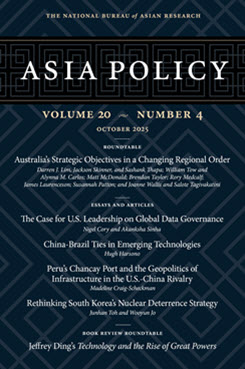by Madeline Craig-Scheckman
October 29, 2025
This essay investigates the geopolitical and economic implications of China’s investment in Peru’s Chancay Port in the context of the U.S.-China strategic rivalry in Latin America.
MAIN ARGUMENT
China’s development of Chancay Port in Peru represents a critical juncture in infrastructure diplomacy, exposing three key challenges for the U.S.: (1) growing risks of economic coercion enabled by rapid Chinese investment, (2) the absence of credible development alternatives, and (3) a misalignment in U.S.-Peru policy narratives. The port is emblematic of how China is reshaping global logistics and mineral trade networks. Drawing on ten expert interviews, this policy essay highlights potential pathways for a U.S. response. To respond effectively, the U.S. must adopt a more comprehensive strategy that focuses on strengthening the economic partnership, building institutional capacity, and employing effective communication strategies.
POLICY IMPLICATIONS
If Chinese investment in ports like Chancay accelerates without matched U.S. engagement, then China will increasingly shape the rules and routes of global logistics and mineral trade in the Western Hemisphere.
If the U.S. wants to counter China’s growing influence in Latin America, then it must prioritize infrastructure investment and regulatory capacity-building, especially in sectors tied to critical minerals and port governance.
Framing Chinese investment primarily as a threat undermines U.S. credibility unless it is accompanied by concrete alternatives that address Peru’s economic development needs.
Madeline Craig-Scheckman is a PhD Candidate in Public Policy at Northeastern University (United States). Her research explores the geopolitics of critical minerals and green industrial policy, with a focus on the impacts of U.S.-China competition. As a Chinese Language Fellow with the National Bureau of Asian Research, she is studying Mandarin at National Taiwan University for the 2025–26 academic year. She holds a master’s degree in international affairs from George Washington University and previously worked on renewable energy policy and development in Washington, D.C.
About Asia Policy
Asia Policy is a peer-reviewed scholarly journal presenting policy-relevant academic research on the Asia-Pacific that draws clear and concise conclusions useful to today’s policymakers. Asia Policy is published quarterly in January, April, July, and October and accepts submissions on a rolling basis. Learn more
